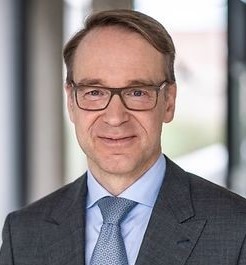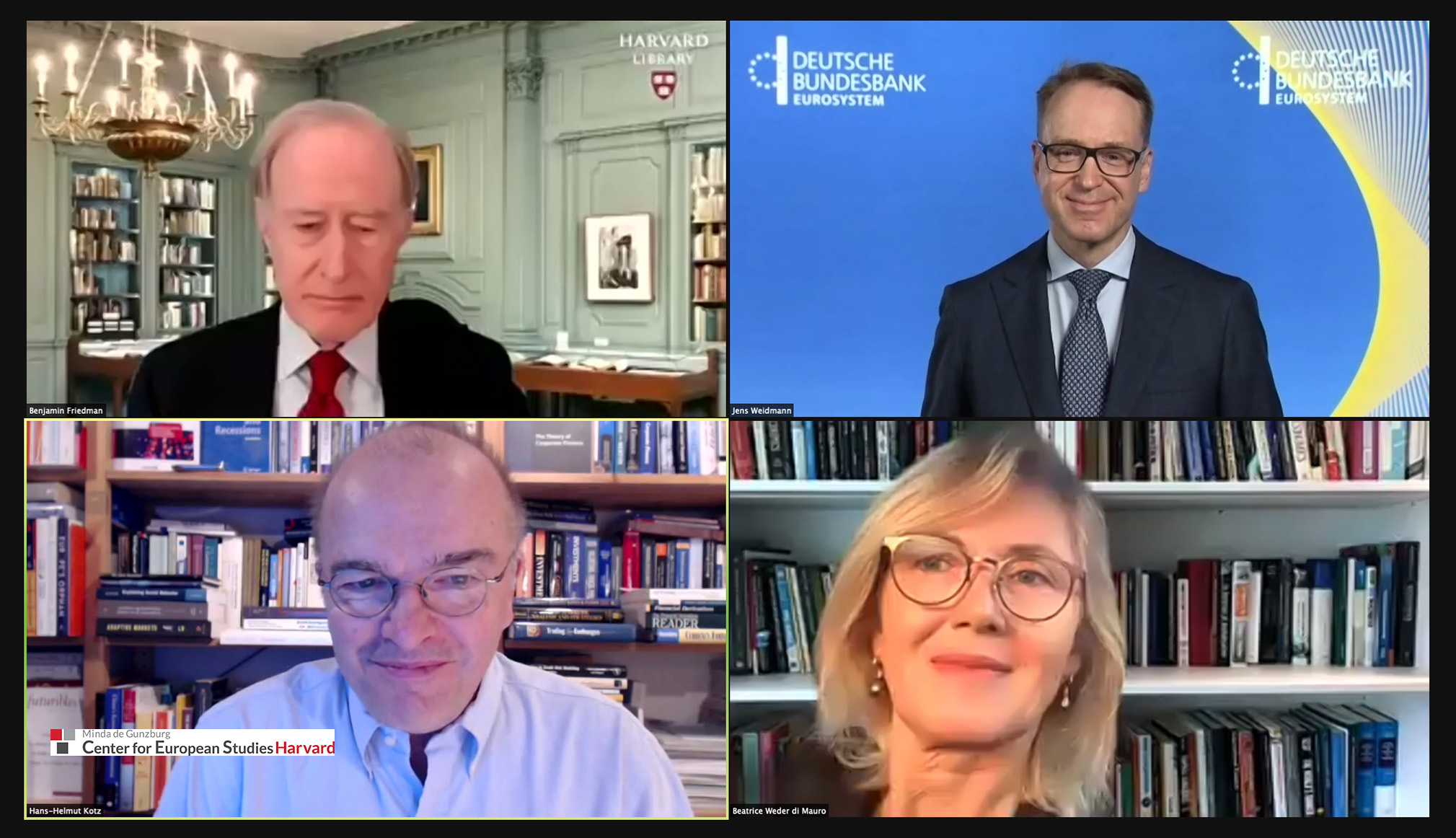By Sarah Palmer
The last time President of the Deutsche Bundesbank Jens Weidmann spoke at Harvard’s Minda de Gunzburg Center for European Studies (CES), the economic landscape was fundamentally different. Returning almost seven years later, he addressed the consequences of a global pandemic, a joint shock to demand and supply, and the short-term as well as possibly longer run ramifications.
Part of the European Economic Policy Forum, this discussion was chaired by CES Resident Faculty Hans-Helmut Kotz and featured economists Benjamin Friedman, William Joseph Maier Professor of Political Economy at Harvard University, and Beatrice Weder di Mauro, President of the Centre for Economic Policy Research (CEPR).
President Weidmann spoke to the current efforts at restarting EU economies, likening them to the post-WWII Marshall Plan. “In these times of acute crisis, EU member states acted in solidarity,” Weidmann stated. EU governments have agreed on a €750 billion recovery package whose centerpiece is the Recovery and Resilience Facility that provides grants and loans with the goal of both mitigating the current fallout and structurally strengthening European economies going forward. Most remarkable, while perceived as a one-time emergency program only, these expenditures are underwritten by a joint issuance of debt.

“Looking ahead, international cooperation may be more important than ever – to help the world’s poorest to recover from the crisis, to reform and preserve a rules-based multilateral trading system and to combat climate change. Nobody can go it alone. The time for inward-looking policies should be over.”
These words from Weidmann illustrate his main concerns over the long-term consequences from both the pandemic itself and policies pursued in response. He cautions that while stabilizing government support is necessary to cushion the economic shock, these “crisis measures should be temporary in nature for the resulting deficits to recede automatically after the crisis.”
In confronting the crisis, governments and central banks face a complicated trade-off. They have to provide the necessary fiscal and monetary stimulus to contain the output loss, to prevent a downward spiral on the demand side. At the same time, they should foster the inevitable adjustment to the permanent change of context. COVID-19 comes, in other words, with supply side consequences, that is, substantial sectoral restructuring needs.
When discussing the difference in monetary policy between “permanent changes” and “transitory shocks”, Benjamin Friedman eloquently illustrated the intricacy of this issue. “Transitory disturbances have sufficiently long-lived and persistent consequences that we may as well think of them as permanent for all practical purposes.”

Beatrice Weder di Mauro also voiced concerns that planning too far into the post-pandemic landscape might be premature as this was uncharted territory, and Europe was currently facing the second wave of the pandemic. However, she did agree that the virus was an accelerator that, besides engendering liquidity and solvency problems as well as losses in livelihoods, was acting as a catalyst for change, furthering structural economic shifts that were expected to happen over an extended period of time
Not all these changes are for the better, and they were highlighted by Weidmann’s cautions regarding long-term effects. He focused on three such developments: deglobalization, disruptions in education, and debt accumulation by governments.
As Weidmann explained, COVID-19 has facilitated a rise in inward-looking, protectionist policies. The global shock of the pandemic had an immediate negative effect on global supply chains, especially on imported and exported goods directly required for COVID protection and prevention. Weidmann warned that repatriation of production chains would leave countries vulnerable to domestic shocks, and in the time of a global pandemic, it would become less of a trade-off and more of a lose-lose. He stressed that “since, global economic ties make our societies more prosperous, policymakers also need to maintain open markets.”
To answer concerns over loss of jobs and income, Weidmann highlighted the importance of an “adequate tax system” and investment in education to help workers gain the new knowledge and skills required to adapt to market shifts.
However, with shutdowns that left over a billion children out of school and implementation of unreliable remote learning, the educational system seems to be another victim of the global pandemic. This is a serious concern when it comes to long-term consequences of COVID-19.
As Weidmann outlined, education is essential not only for fostering economic growth, but also “for individual income prospects and economic prosperity.” This means students, often of lower income brackets, less able to handle remote learning, may suffer a learning and skill-building loss, and, as a result, a lower average lifetime income.
Therefore, investing in education or skills would be crucial. This would imply prioritizing growth supporting expenditures since there are limits to debt accumulation. Central banks can only discharge their function when fiscal policy is sustainable. Strong public finances are particularly important in the euro area since member states have relinquished national monetary policy and do not issue their own currency anymore.
“The European Commission estimates that the euro area debt-to-GDP ratio will exceed 100% by the end of this year. And, according to the IMF, the average general government debt of advanced economies is set to exceed 125% of GDP.”
The future of the Europe’s monetary union and the EU is open. Weidmann argues that shifting financial liability to the community level should concurrently lead to a commensurate Europeanization of fiscal policy. This would require closer political integration and perhaps even the establishment of a federal state, a democratic one, of course. The alternative in terms of aligning the radius of liability and decision-making would be to strengthen the fiscal responsibilities of individual member states.
In the end, Weidmann argued, it should be up to the people of Europe to decide, not their central bankers.